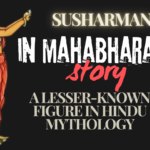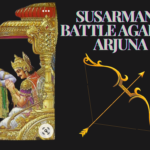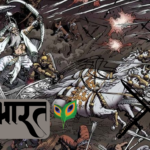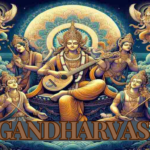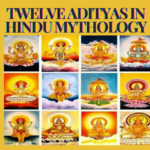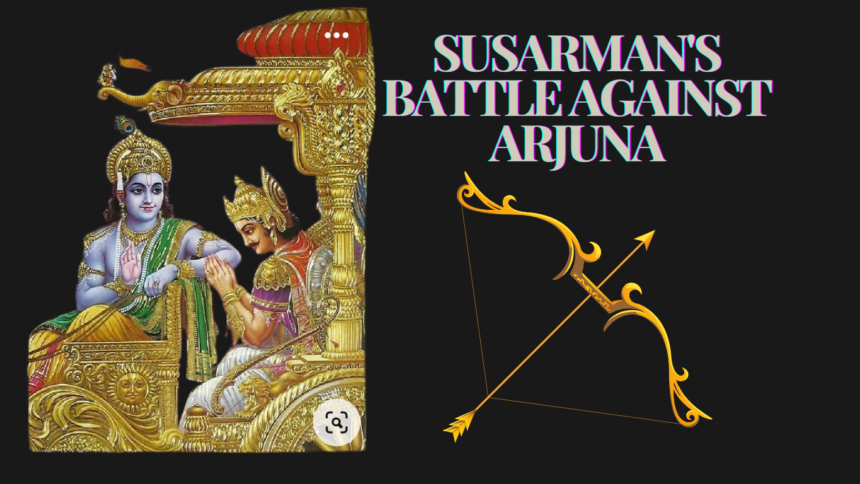The Mahabharata, one of the greatest epics in history, is filled with countless tales of heroism, strategy, and the relentless pursuit of dharma. Among these narratives is the story of Susarman, a formidable warrior allied with the Kauravas, who faced the mighty Arjuna in a fierce and unforgettable encounter. This battle is not just a testament to Arjuna’s prowess but also highlights Susarman’s courage, resolve, and the tragic fate of his men.
Susarman’s Defiant Stand.
As the battle begins, Susarman stands determined to challenge Arjuna, the legendary archer and champion of the Pandavas. He knows the stakes are high, and the odds are against him, but he leads his warriors with unwavering resolve. With a volley of arrows filled with anger and fury, Susarman strikes Arjuna, wounding him and even piercing his divine charioteer, Krishna, with seventy arrows.
However, Arjuna, undeterred by the attack, retaliates with calm precision. His arrows rain down like a storm, cutting through Susarman’s forces with deadly accuracy. Despite Susarman’s valiant effort, his men begin to falter. The sight of their comrades falling to Arjuna’s relentless assault fills them with dread.
The Desperation of the Trigartas.
As Arjuna continues his attack, the battlefield is engulfed in chaos. The warriors of the Trigarta clan, Susarman’s allies, are gripped by panic. Arjuna’s onslaught is so fierce that it seems as if the end of days has arrived. Some of the Trigartas abandon their horses, others jump from their chariots, and still others dismount from their elephants, fleeing in every direction.
Even the foot soldiers, overwhelmed by fear, throw down their weapons and run, ignoring the orders of their leaders, including Susarman himself. Despite his commands and the efforts of other noble kings to rally their troops, they continue to desert in droves, their spirits broken by the terror of Arjuna’s wrath.
Duryodhana and Bhishma’s Counterattack.
Witnessing the disarray in Susarman’s forces, Duryodhana, the leader of the Kauravas, realizes that immediate action is necessary to support his ally. Together with the grand patriarch Bhishma, Duryodhana launches a fierce counterattack against Arjuna. They press forward, hoping to turn the tide of battle and protect Susarman from certain defeat.
Despite the chaos surrounding him, Duryodhana remains unyielding. Alongside his brothers, he fights with undiminished vigor, determined to hold the line against the mighty Arjuna. But the battle is far from over, and the fate of Susarman and his men hangs in the balance.
Who killed Susharma in the Mahabharata?
Mindful that Arjuna and Krishna knew how to break the arrangement, Susharma occupied them, guaranteeing that they would be on the opposite side of the chakravyuha. He was killed by Arjuna on the last day of the conflict while the remainder of his military was withdrawing.
Who is the biggest enemy of Lord Arjuna?
Being a companion of Duryodhana, Karna turned into a foe of Arjuna. Karana was likewise jealous of Arjuna’s standing, in light of the fact that in spite of being capable in toxophilism, he was not given the regard he ought to have been given, being pronounced a Shudra. Karna was desirous of Arjuna’s glory, so he turned into Arjuna’s foe
Susarman: A Warrior Unbowed.
Though his forces may falter and flee, Susarman’s courage is undeniable. He stands resolute on the battlefield, refusing to surrender in the face of overwhelming odds. His determination to confront Arjuna, despite the near-certain defeat, speaks to his warrior spirit and commitment to his allies. Even as his men desert him, Susarman fights on, embodying the qualities of a true warrior.
Who were the 7 warriors who killed Abhimanyu?
Abhimanyu was quickly attacked by the seven maharathis — Drona, Karna, Kripa, Kritavarma, Ashvatthama, Jaydrath, Shakuni and Dushasan. They crushed his chariot, killed the ponies of his chariot, broke his weapons, and shot him with various bolts.
In this intense and dramatic chapter of the Mahabharata, Susarman’s battle against Arjuna serves as a powerful reminder of the unpredictable nature of war. It is a story of courage and desperation, of fierce determination against an unstoppable force, and of a warrior who, even in the face of defeat, refused to bow to fate..
